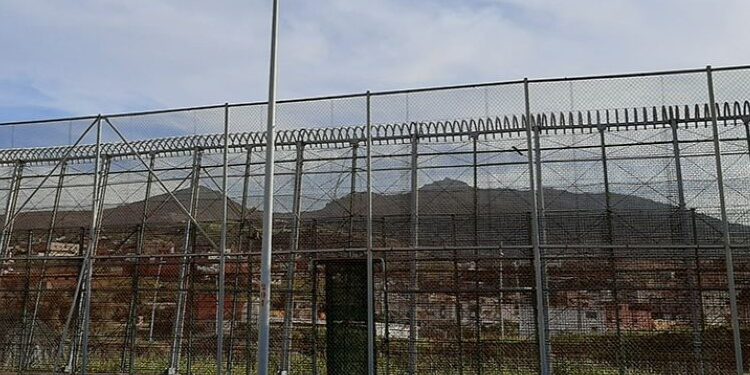Eduardo González
Amnesty International (AI) and the Spanish Commission for Refugee Aid (CEAR) yesterday accused the authorities of Spain and Morocco of impeding the clarification of the death of 37 people at the Melilla border, of which today marks one year. The Ministry of the Interior rejected the criticisms and assured that the Attorney General’s Office investigated these facts “with all the guarantees and depth” without appreciating any crime.
On the one hand, Amnesty International denounced “the apparent cover-up by the Spanish and Moroccan authorities”, which “hinders” the attempts of the victims’ families to “find out what happened to their loved ones and their efforts to obtain justice, truth and reparation”.
The organization recalled that “at least 37 people died after around 2,000 sub-Saharan migrants and refugees attempted to enter Spain from Morocco on June 24, 2022.” Apart from that, he continued, “at least 76 others remain unaccounted for”. Despite this, “the Spanish and Moroccan authorities have so far failed to conduct an effective and independent investigation, leaving dozens of bereaved families in distress.”
“On the one-year anniversary of the Melilla massacre, the Spanish and Moroccan authorities not only continue to deny any responsibility, but frustrate attempts to ascertain the truth. Bodies remain in a morgue and in graves, and efforts to identify the dead and inform their families are blocked,” said Agnès Callamard, Secretary General of Amnesty International.
“One year after the tragedy,” AI continued, “the Spanish and Moroccan authorities have not provided a complete list of names of the victims and the causes of their deaths, nor have they provided images from surveillance cameras that could serve as the basis for an investigation.” “Furthermore, they have failed to adequately investigate actions that constitute crimes under international law and human rights violations, as well as racism and discrimination at the border,” it warned.
According to Amnesty, “the Spanish authorities refused to open an independent investigation and, in December 2022, the Prosecutor’s Office closed its investigation into the deaths on the grounds that they had found no evidence of criminal conduct by Spanish security forces.” The Moroccan authorities, for their part, “have not opened any investigation into the use of force by their border agents and have made it virtually impossible for families and NGOs to search for the missing and deceased,” it continued.
In its response, the Ministry of the Interior assured Amnesty International yesterday that the State Attorney General’s Office investigated “with all the guarantees and in depth” the facts, without appreciating a crime. “Amnesty International confuses the lack of support for its story with an alleged lack of investigation,” the Ministry said in a statement.
CEAR
For its part, the Spanish Commission for Refugee Aid (CEAR) denounced that “the only investigation carried out on the case was shelved by the Public Prosecutor’s Office last December, without any responsibility being determined for the at least 37 deaths, 77 disappearances and 470 illegal returns”. On the other hand, he recalled, these practices “were denounced by the Ombudsman for preventing access to the asylum procedure with the due guarantees.
For this reason, CEAR warned that “it is urgent to implement accountability and investigation mechanisms to ensure justice, truth and non-repetition,” and demanded that a “thorough, transparent and independent investigation” be carried out so that the victims and their families can be compensated for the damage suffered.
According to CEAR, most of the young people who were involved in the events came from Sudan, South Sudan and Chad, “people with a high rate of recognition of international protection in Spain due to the conflicts in their countries”. However, the Moroccan authorities “prevent them from accessing the border post to request asylum, especially for people of sub-Saharan origin”, and Spain “does not enable them to do so in embassies and consulates, or through other channels provided by the Asylum Law”, the organization lamented.
The Commissioner for Human Rights of the Council of Europe, Dunja Mijatovic, was able to confirm this situation after visiting the city of Melilla last November. During this visit, CEAR recalled, Mijatovic also urged Spain to “review cooperation with Morocco on border control” and to “suspend any common activity that leads to human rights violations”.
For this reason, CEAR considers it necessary to put an end to “the externalization of borders” and to facilitate access to protection “in a legal and safe manner”, putting an end to “opaque agreements that do not guarantee access to human rights and that on many occasions result in the loss of human lives”. Likewise, the organization demands an end to the summary returns at the borders of Ceuta and Melilla, “which are totally contrary to international treaties”, and “strongly denounces the use of violence during the events of June 24, 2022”.
“The fact that it has not been resolved and that the investigations are falsely closed leaves the door wide open for such a tragedy to happen again, endangering the lives of thousands of people seeking refuge,” warned CEAR’s director general, Estrella Galán. “One of the worst tragedies in our southern border, together with the one that happened in Tarajal in 2014, cannot go unpunished again”, she concluded
.





